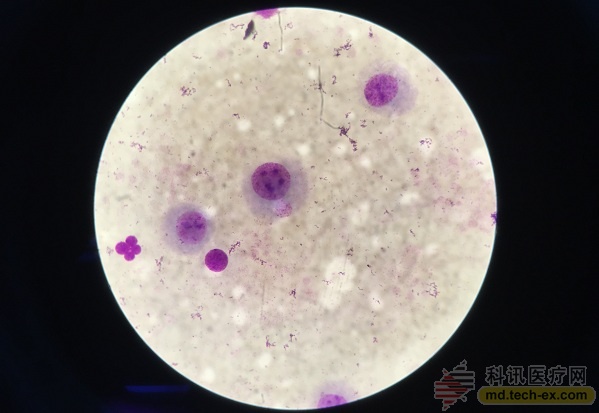Release date: 2017-06-06
Recently, Yasen Technology teamed up with the Central Laboratory of the Second Affiliated Hospital of Xiamen Medical College (hereinafter referred to as: Xiamen Second Hospital) to announce the joint development of a lymphatic micronuclear cell intelligent inspection system. The system will check the lymphocyte micronucleus cell rate through a new artificial intelligence technology to achieve a fully automated process covering the production, scanning, identification and statistical analysis of slides. At present, the automatic detection rate of micronucleated cells in the system is over 90%. The system will be comprehensively researched and tested. In the future, it is hoped that through a large number of image training, the accuracy rate will be increased to over 95%, and the occupational disease prevention and control work will enter a new stage of artificial intelligence.
Traditional micronuclear cell inspection takes a long time and is inefficient
The lymphocyte micronucleus rate refers to the number of cells containing micronuclei in 1000 binuclear cells in the micronucleus test. The normal range is from 0 to 6 ‰. For occupational populations who are frequently exposed to radioactive sources (such as nuclear power plants, hospital radiology, customs inspection, etc.), the determination of lymphocyte micronucleus rate is one of the important indicators for the evaluation of radiation damage.
For a long time, this examination has relied mainly on manual microscopic methods by microscopy because of the large number of fields and the large number of mother cells, which are difficult to count morphologically. Not only is it time-consuming, inefficient, repetitive, but also prone to fatigue, which leads to leakage, and more serious damage to the doctor's vision. Limited by the resources of the physician, the greater the efficiency of such inspections and the coverage of the population. 
Lymphocyte micronucleus, referred to as MCN
Artificial intelligence enables automatic identification, automatic tagging, and statistical analysis
As the hospital with qualifications for occupational disease examination in Fujian Province, Xiamen Second Hospital has always hoped to adopt new technology to achieve breakthroughs in inspection efficiency. Through the joint research with Yasen, the future inspection will rely on Yasen's advanced learning algorithms, feature interception and other advanced technologies to complete automatic identification, automatic marking and statistical analysis.
This is not only expected to improve the efficiency of doctors, but also to meet the accuracy rate of more than 90%, and to minimize the rate of false negatives. At present, the number of inspections carried out by Xiamen Second Hospital is 3,000 a year, and the number of people applying this inspection in the province exceeds 100,000 person/year. Through this cooperation, the two sides hope to achieve a large jump in inspection capacity at the end of 2017 and initially meet regional inspection requirements.
Due to its economic, simple and rapid advantages, micronuclear tests have been routinely tested by many countries and international organizations for independent safety evaluation of new drugs, food additives, pesticides and cosmetics. In addition, the micronucleus test has important value in the genotoxicity of foreign compounds, genetic damage monitoring in occupational exposure populations, and on-site ecological environment detection, and has a broader role in the diagnosis and prevention of malignant tumors such as liver cancer, esophageal cancer, and lung cancer. Value and meaning are expected to be the latest rapid, effective, and cancer screening tools.
Lymphocyte micronucleus examination will become part of the integration analysis of Yasen Tianyi artificial intelligence platform (image analysis, medical record analysis, pathological analysis). In the future, Yasen will continue to deepen this field for more relevant hospitals, third-party testing. The center provides artificial intelligence testing services to provide timely, efficient inspection services for front-line workers working in the radioactive environment.
Source: Arterial Network
Wifi IP PTZ Outdoor Home CCTV Battery Security Camera,Wifi IP PTZ Outdoor Home CCTV Battery Security Camera,Wifi IP PTZ Outdoor Home CCTV Battery Security Camera,Wifi IP PTZ Outdoor Home CCTV Battery Security Camera,Wifi IP PTZ Outdoor Home CCTV Battery Security Camera
1.H.264 compression format, synchronous real-time monitoring and high-definition video 1080P real-time image transmission, adaptive
2.network, up to 10/15 frames / sec smooth experience Distribution network connection method: add network cable The company
3.independently develops WiFi camera solutions, mobile APP software HomeBase: more fluent real-time videos and less battery
4.consumption as a network repeater HomeBase: expand the coverage of Wi-Fi to reach up to 300 meters on empty space HomeBase pairs
5.up to 4 cameras 180 days battery life rechargeable each time PIR detection zone: 7~10 ft (2~3m) above the ground, up to 30ft (10m)
distance Motion detection & PIR alert 3 work modes: battery saving / best monitoring / customize Echo cancellation and noise
6.suppression technology, the perfect full-duplex voice effect, HomeBase alert siren Powerful night vision :6 20MIL dot matrix
l7.ights, infrared range of 10-15 meters Bracket dismountable with convenience of recharging IP66 waterproof rating Camera support
8.sharing add, APP set user login management, let your camera security connection APP opens the camera after-sales service link,
9.email, phone consultation, camera distribution network video link, so that you can completely solve the camera after-sales trouble
Battery Security Camera,Security Camera 4G Battery,cctv Security Camera,outdoor Security Camera
Shenzhen Fuvision Electronics Co., Ltd. , https://www.szsolarcamera.com